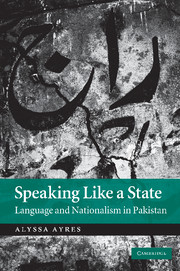Book contents
- Frontmatter
- Contents
- List of illustrations
- List of tables
- Acknowledgments
- Note on transliteration
- Introduction
- 1 Articulating a new nation
- 2 Urdu and the nation
- 3 The nation and its margins
- 4 The case of Punjab, part I: elite efforts
- 5 The case of Punjab, part II: popular culture
- 6 History and local absence
- 7 Bringing back the local past
- 8 Speaking like a state: language planning
- 9 Religion, nation, language
- 10 Conclusion
- Bibliography
- Index
10 - Conclusion
Published online by Cambridge University Press: 25 August 2009
- Frontmatter
- Contents
- List of illustrations
- List of tables
- Acknowledgments
- Note on transliteration
- Introduction
- 1 Articulating a new nation
- 2 Urdu and the nation
- 3 The nation and its margins
- 4 The case of Punjab, part I: elite efforts
- 5 The case of Punjab, part II: popular culture
- 6 History and local absence
- 7 Bringing back the local past
- 8 Speaking like a state: language planning
- 9 Religion, nation, language
- 10 Conclusion
- Bibliography
- Index
Summary
Pākistān kā matlab kyā? Lā ilāhā illallāh.
What is the meaning of Pakistan? There is but one God, Allah.
Qudratullah Shahab, “Pākistān kā matlab kyā?” Shahābnāma (1987)The foregoing chapters have offered a set of interlocking discussions concerning the cultural logic of the nation and its language(s) in a paradigmatic country, Pakistan. We first examined, in Chapter 1, the impact of British colonization on this region of multilinguality, and saw how British assumptions about the isomorphic relationship of race and language led to the differentiation of an Indian lingua franca, Hindustani, into Hindi/Hindu and Urdu/Muslim languages. This process fed into religious reform movements in the latter part of the nineteenth century which sought to purify and in fact codify the practices of Hindu and Muslim Indians, creating firmer boundaries of religion as well as language from a previous sociology of boundaries that had been far “fuzzier.” This schismogenesis grew to such an extent that by the 1930s it became possible to advance a new idea about nationality, the “Two Nations Theory,” which posited that Hindus and Muslims were separate nations which could not coexist in a single polity.
Regardless of the historical and empirical problems with that argument, the Two Nations Theory succeeded politically. With the departure of the British, India achieved independence but at a huge price: the carving of a two-winged nation-state to be a home for the Muslims of the Indian subcontinent, amidst a catastrophic loss of life and the displacement of millions.
- Type
- Chapter
- Information
- Speaking Like a StateLanguage and Nationalism in Pakistan, pp. 188 - 195Publisher: Cambridge University PressPrint publication year: 2009



